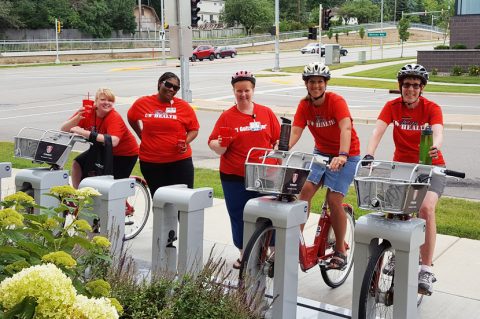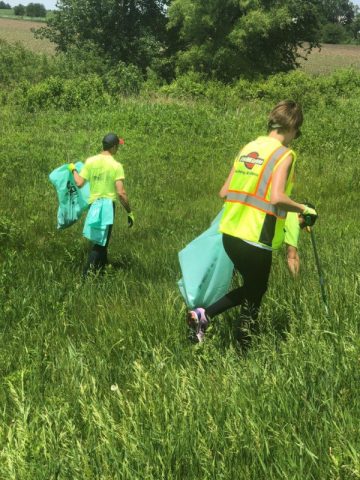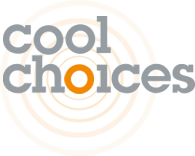
If you aim for big change, you’ll need to involve everyone.
Everyone—from business leaders to rank-and-file staff, residents, senior citizens to students, the folks who always show up and the ones who never do.
Whenever you talk about your community’s climate commitment be clear: this is something we’ll accomplish together.
People will get involved IF
- You make it easy for them to participate
- It’s clear their peers—friends, family, co-workers—are also participating
- Participation feels good (I am making a difference or We are leaders in our region or I’m proud of what I did or It was fun to work together)
To ensure participation feels good, always focus on the positive. Showcase folks who are making a difference, celebrate cumulative impacts. Never shame people—it doesn’t work and it feels terrible.
Recognizing folks also serves to prove that people are participating. Humans are social creatures so we take cues from our peers. When you showcase regular folks doing extraordinary things, you are encouraging others to step up and lead as well.
Make it easy by giving folks a short and clear action list—things that they can do to contribute to the plan. Don’t list everything—limit yourself to 3-5 important items and then add more actions over time. (A list of 100 actions is hard to read much less act upon! But if you give me a short list and I can cross off a few items while you add more, that feels doable.)
For example, you might say:
Residents can participate by:
- Calculating their annual electric usage and comparing that usage to a city average
- Opting to bike or walk instead of driving when trips are less than 1 mile
- Test driving an electric vehicle (which you make available at community events…so that it’s easy to do)
- Programming a thermostat to set back when no one is home (your own thermostat or help someone else program theirs)
- Requesting a free energy-savers kit from Focus on Energy
Businesses can participate by:
- Comparing their energy usage to similar entities via the free ENERGY STAR Portfolio manager program
- Sharing a story about their successes in reducing energy costs in recent years (which gives you something to recognize and celebrate)
- Encouraging employees to carpool, bike or walk instead of driving alone
- Talking with their landlord about potential energy efficiency or renewable energy upgrades to their building
Note that most of these actions are really simple and low cost. When engaging the community it’s effective to start small and grow commitments over time rather than asking someone to invest in a big change right away.
At the same time, you want to be clear about the ultimate goal: 100% clean energy. Each action contributes to that bigger goal, just as each workout contributes to a person’s goal of better health.
Track, Reward Actions
Create a process where folks can tell you when they’ve completed a particular action. This could be as simple as a Google survey. You can use the information to share back community-scale results.

15 local businesses are using ENERGY STAR Portfolio Manager.
100 local residents have test driven an electric vehicle—we are ready for the future!
The participant data will also be useful as you pursue deeper efficiency measures over time. It also enables you to recognize leaders and to provide some random awards to participants.
Ultimately you’ll want to be encouraging entities to pursue:
- Strategies to save energy and other resources
- Renewable energy
- Electrification of heating, water heating and transportation
- Active transport
But, again, folks can’t absorb all of that at once. Start with simple low-cost actions and, as people see benefits and see their friends taking action, encourage more efforts.
As you do this, explore creative ways to showcase and accelerate results. Consider offering businesses a window decal acknowledging their participation, engage school children in encouraging more actions at home. Integrate your clean energy commitment into local festivals and events, using those natural gatherings to recognize clean energy leaders.
Check out our free Sustainable Communities webinar series for more on effective engagement.

